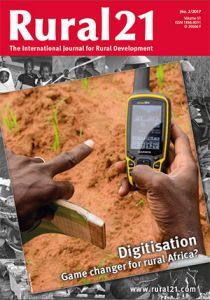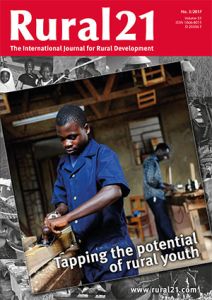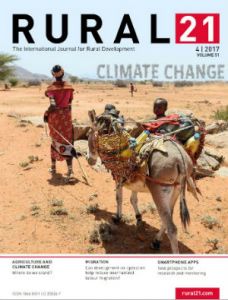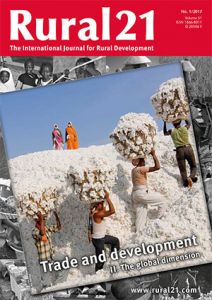Jahrgang 2017
-
Rural 21 (engl. Ausgabe 2/2017)Focus 2/2017: Digitisation
Digital technologies hold a huge potential for poverty reduction and inclusive development in rural areas, as numerous success stories show: recommendations on crop growing and veterinary extension services for farmers, vocational training for rural youth, health and nutrition consultancy for pregnant women and young mothers, mobile banking systems for those without a bank account, the set up of early warning systems …. However, much of the potential of the new technologies still lies in the future, and inherent complexities are often underestimated. We have asked our authors to keep an eye on the practical relevance of the examples they are presenting from their work – no isolated solutions but technologies and initiatives that bear a potential for up-scaling, are (or can be) locally adapted and can above all also benefit small-scale farmers and the young generation, who are more strongly represented in Africa than in any other continent. We also asked them to demonstrate why some solutions that seem promising at first glance are doomed to fail and which areas have a lot to catch up on if the rural digitisation potentials are to be unleashed in a manner that really deserves the attribute ‘inclusive’. Erfahren Sie mehr -
Rural 21 (engl. Ausgabe 3/2017)Focus 3/2017: Youth
Given that today, two out of five economically active youth around the world are unemployed, or work, but live in poverty, and that alone in sub-Saharan Africa, the youth population is set to double, reaching more than 350 million by 2050, creating income and employment opportunities for these young people is certainly one of the areas in most urgent need of action. We demonstrate initiatives addressing these issues from a wide range of countries throughout the world, and let representatives of development co-operation, politics, the private sector and, last but not least, rural youth give their views. Erfahren Sie mehr -
Rural 21 (engl. Ausgabe 4/2017)Focus 4/2017: Climate Change
Agriculture is a major contributing factor to climate change; at the same time, it is one of the areas most affected by climate change, which is jeopardising global food security. But is the significance of agriculture also reflected in international climate negotiations? And, after the recent world climate summit, what’s next? Our authors have a look at what progress has been made in the debate, and, taking different examples, they demonstrate how resilience towards climate change can be enhanced not only for agriculture, but also for communities as a whole. Erfahren Sie mehr -
Rural 21 (engl. Ausgabe 1/2017)Focus 1/2017: Trade and development II: The global dimension
Since the turn of the century, global agricultural trade flows have roughly tripled, reaching 1.2 trillion US dollars in 2015. However, the forecasts for future developments are mixed – also because of uncertainty caused by the new US President’s statements on trade policy. This second part of our trade focus isn’t meant to be a rehash of the familiar “free trade versus protectionism” arguments. But the framework really is different. Climate change, price volatility in the agricultural markets as well as Agenda 2030 all call for a review of how individual aspects relate to one another in the overall context. Erfahren Sie mehr






